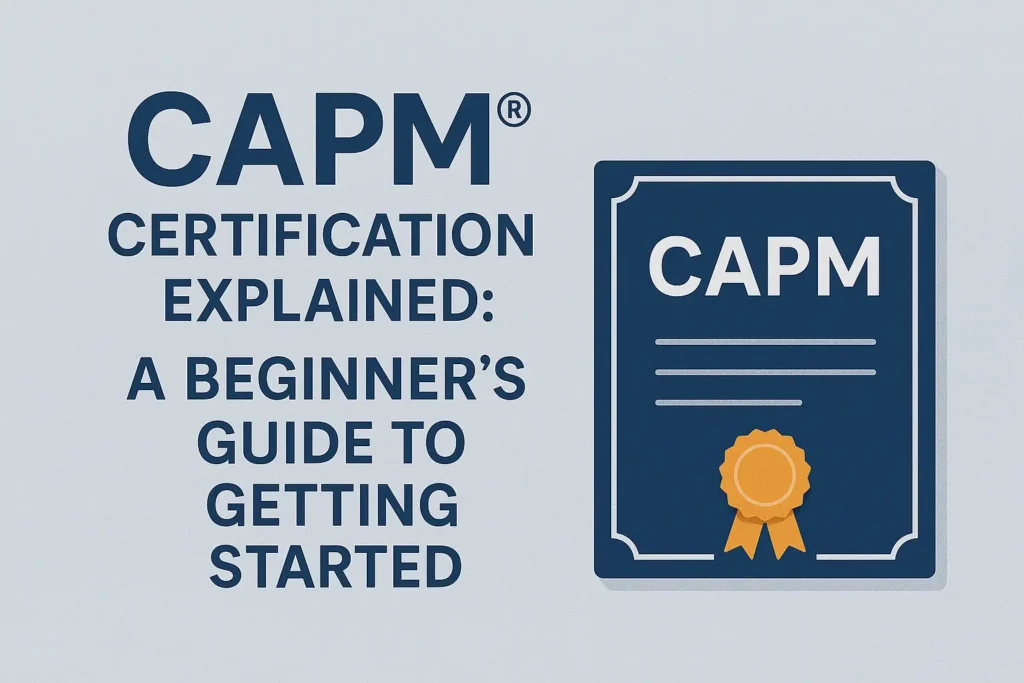CAPM® Certification Explained: A Beginner’s Guide to Getting Started
By: Ryan Malaluan, CAPM®; Editor: Geram Lompon; Reviewed by: Alvin Villanueva, PMP®
The
One of the most accessible and recognized certifications offered by PMI is the Certified Associate in Project Management (CAPM)®. This certification is ideal for individuals who are new to
Beyond the recognition, the CAPM certification can significantly enhance your career prospects. It demonstrates your commitment to professional growth and may give you an edge when applying for entry-level project management roles. It’s also a stepping stone to more advanced certifications like the PMP® (Project Management Professional).
Whether you’re aiming to start a new career or strengthen your current one, the CAPM certification is a solid investment in your future.
Table of Contents
- What Is CAPM Certification and Why It Matters
- CAPM Certification Requirements: Are You Eligible to Apply?
- CAPM vs PMP: Which Project Management Certification Is Right for You?
- How to Choose the Right CAPM Course for You
- Everything You Need to Know About the CAPM Exam
- CAPM Certification Salary and Career Opportunities
- Step-by-Step: How to Get and Maintain Your CAPM Certification
- Conclusion: Take the First Step Toward Your Project Management Career
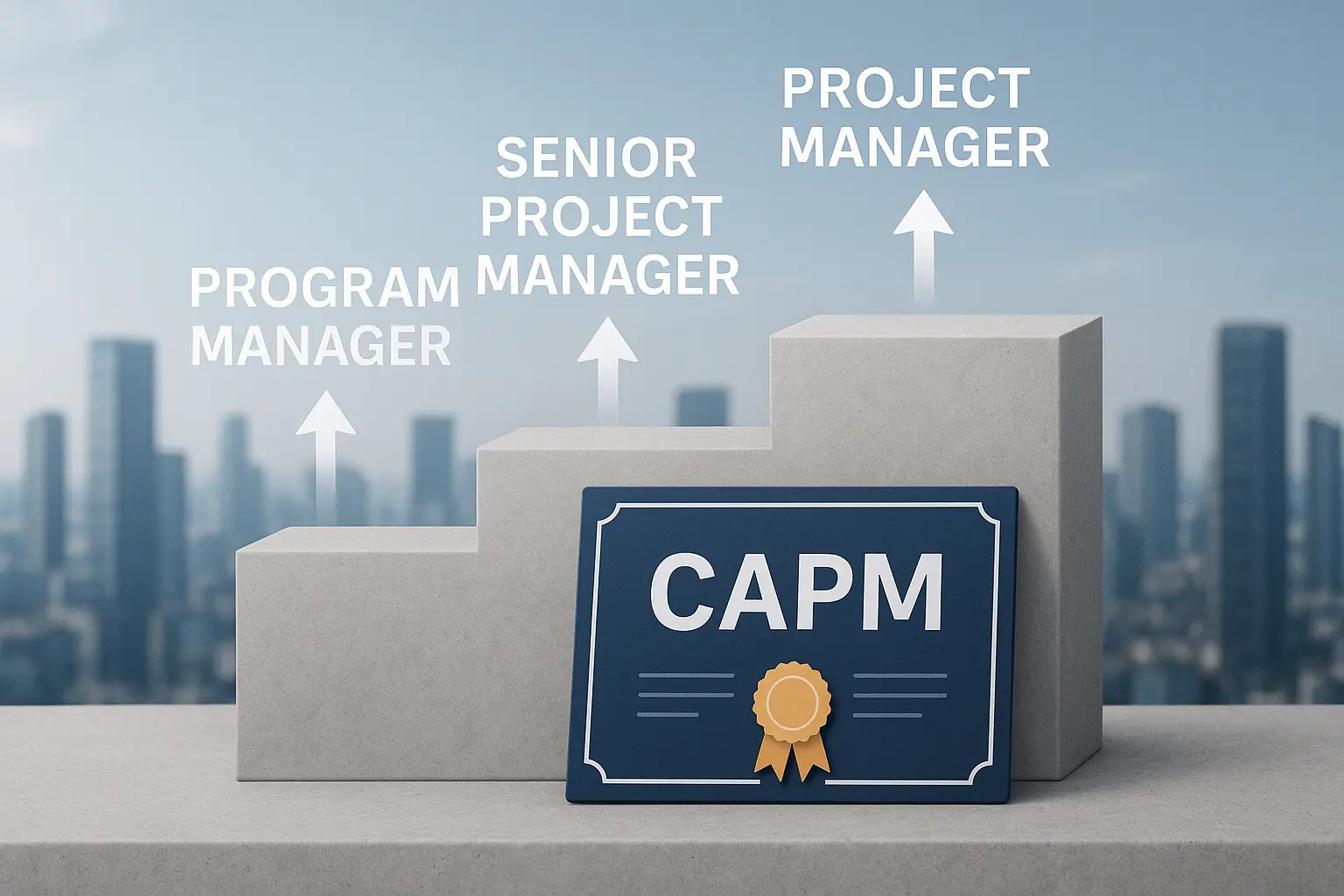
What CAPM Certification Is and Why It Matters
The Certified Associate in
Offered by the globally recognized Project Management Institute (PMI), the CAPM demonstrates your understanding of fundamental
It can help set you apart from other entry-level candidates and open doors to project coordination and support roles. As a candidate pursuing the CAPM certification, you demonstrate your eligibility and readiness to begin a career in
CAPM Certification by PMI?
The CAPM certification is for those with little or no experience in
To get the CAPM certification, you need to meet PMI’s rules. This includes having a secondary degree and a certain amount of
The CAPM certification exam covers knowledge areas from the PMBOK Guide, including exam content, format, and application requirements, to ensure candidates are prepared for entry-level project management roles.
Benefits of Getting CAPM Certified
Getting the CAPM certification can boost your career in
- A deeper understanding of project management concepts and terms
- Being more attractive to employers
- Showing you’re serious about project management
- Better skills in managing projects
Here’s a look at the differences between professionals with and without CAPM certification:
| Aspect | Without CAPM Certification | With CAPM Certification |
|---|---|---|
| Project Management Knowledge | Less understanding of project management concepts | Proven knowledge of |
| Career Opportunities | Less opportunities, mostly non-project management roles | More opportunities, including |
| Professional Credibility | Less credible to employers and clients | More credible, showing commitment to project management |
By getting the CAPM certification, you can really improve your career chances. It can help set you apart from other entry-level candidates and open doors to project coordination and support roles. The certification also helps you stand out among other candidates in the job market, making you a more competitive applicant. It sets a strong base for your future in
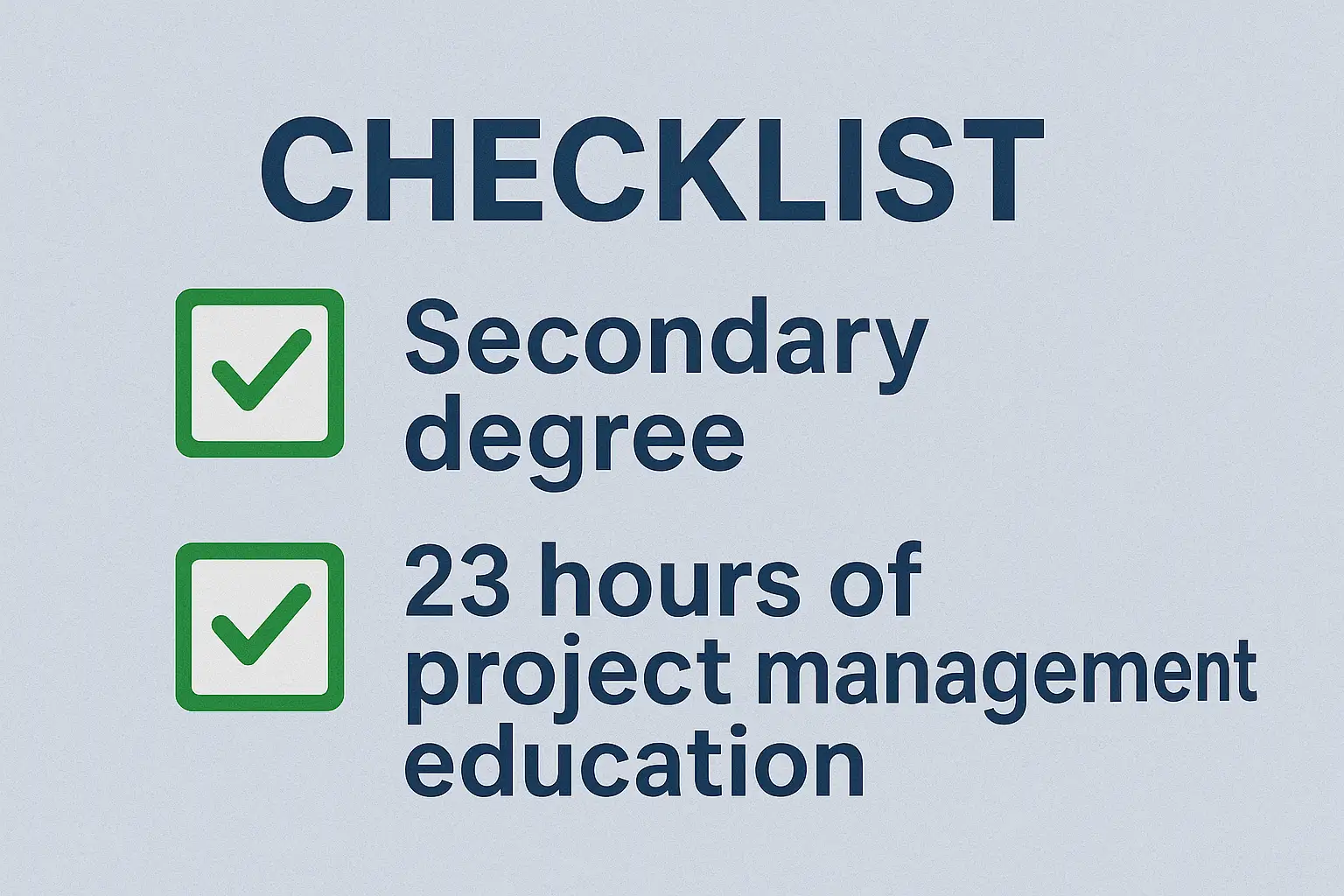
CAPM Certification Requirements: Are You Eligible to Apply?
Beginning your CAPM certification journey requires meeting specific eligibility criteria set by the
To qualify, you must have a secondary degree, such as a high school diploma or its global equivalent. An associate degree is also accepted as an educational background for eligibility. Additionally, you need to complete 23 hours of
These standards are designed to help you fulfill the eligibility requirements for the CAPM exam and ensure you’re ready to apply core
What Are the Basic Eligibility Criteria?
To qualify for the CAPM certification, you must meet two essential requirements:
- Educational Background: You need to have a secondary degree—this includes a high school diploma, GED, or an associate degree (an associate degree is accepted as a qualification).
- Project Management Education : You must complete at least 23 hours of formal
project management education before taking the exam.
| Eligibility Criterion | Description |
|---|---|
| Secondary Degree | High school diploma or associate degree (an associate degree is accepted) |
| Project Management Education | 23 hours of |
This training can be completed through online courses, workshops, or in-person programs. Meeting these criteria ensures you have a solid foundation in
What You’ll Need to Apply
Before applying for the CAPM certification, make sure you have the following ready:
- Your secondary degree certificate (such as a high school diploma or equivalent)
- Details of your project management education , including the course name, provider, and completion date
- A valid government-issued ID to verify your identity
These documents are essential for meeting PMI’s eligibility requirements and ensuring a smooth application process. Having them organized beforehand will help you complete your CAPM application quickly and accurately, avoiding delays or issues with verification. Be sure to double-check all information before submitting.
CAPM Application Process Explained
The CAPM application process has several steps:
- Create an account on the PMI website.
- Fill out the CAPM application form, providing your educational background and
project management education details. - Submit your application and wait for PMI to review and approve it.
- Once approved, schedule your CAPM exam within the validity period of your approval.
By understanding and meeting the CAPM certification requirements, you can successfully apply for and achieve your CAPM certification. This is a big step in your project management career.
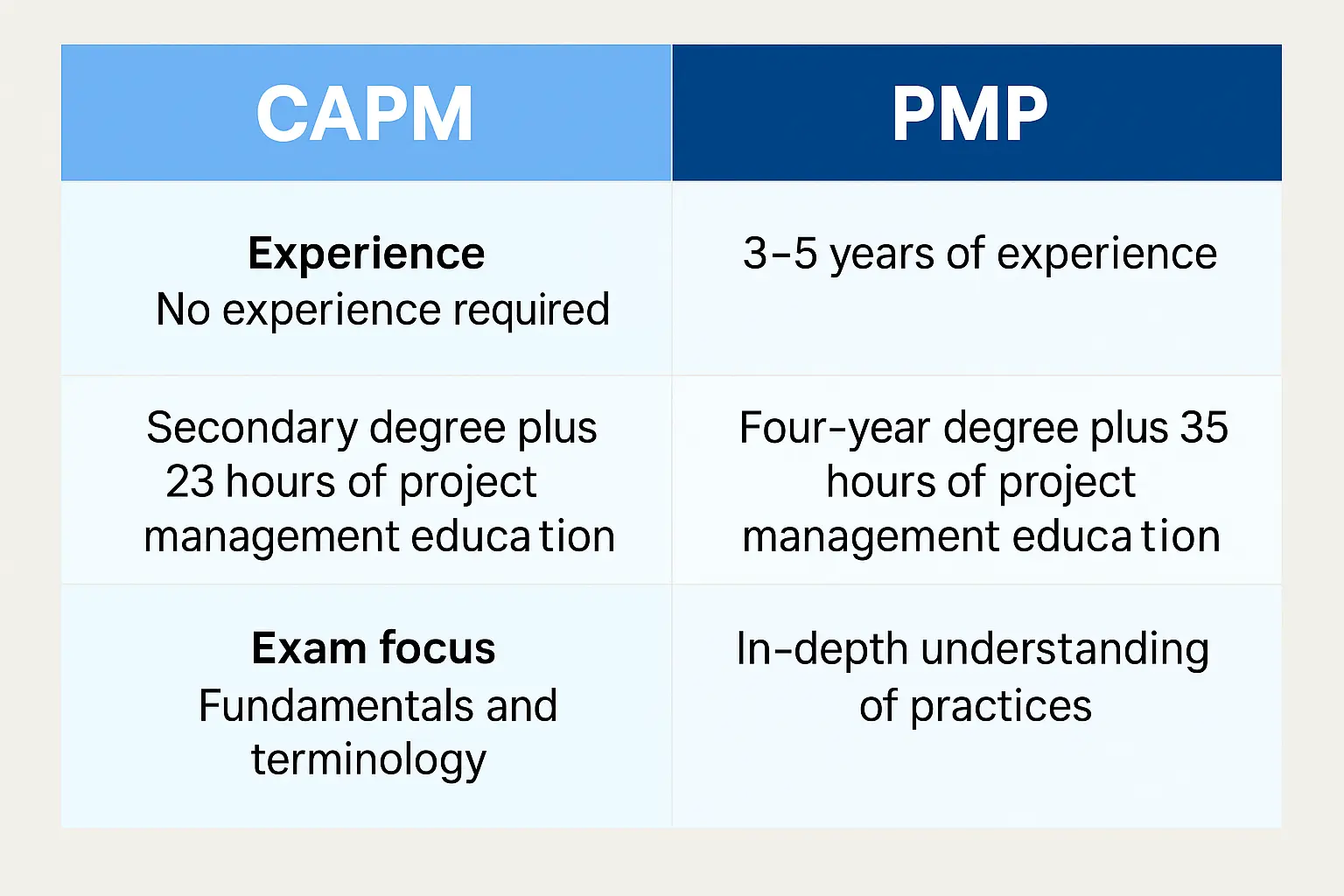
CAPM vs PMP: Which Project Management Certification Is Right for You?
When deciding between the CAPM and PMP certifications, consider your professional experience and long-term career goals. Both credentials are offered by the Project Management Institute (PMI), but they cater to different stages of a
The CAPM is ideal for those just starting out, offering foundational knowledge and credibility. In contrast, the PMP is designed for experienced professionals who manage projects and teams. PMP candidates must meet more rigorous eligibility requirements, reflecting the advanced level of expertise and responsibility expected for this credential.
Choosing the right certification depends on where you are in your journey and what you aim to achieve in the field of
Experience and Education: What Sets Them Apart
CAPM is for newcomers or those wanting to show they know project management basics. You need a secondary degree and 23 hours of
PMP is for those with more experience. You need a secondary degree and either 7,500 hours of experience or a four-year degree and 4,500 hours.
Plus, you need 35 hours of
| Certification | Eligibility Criteria | Education Requirement | Experience Requirement |
|---|---|---|---|
| CAPM | Secondary degree | 23 hours of |
None |
| PMP | Secondary degree | 35 hours of |
7,500 hours (or 4,500 hours with a four-year degree) |
The PMP exam is designed for experienced project professionals seeking to validate their advanced project management skills.
Comparing the Exam Content and Format
Both exams test your
CAPM has 150 multiple-choice questions for 3 hours. PMP has 180 questions for 4 hours on a computer or 230 for 4 hours on paper.
| Exam Details | CAPM | PMP |
|---|---|---|
| Number of Questions | 150 | 180 (CBT) or230 (PBT) |
| Exam Duration | 3 hours | 4 hours |
| Focus | Basic |
Application of |
Career Impact: Which Has Higher ROI?
CAPM and PMP impact your career differently. CAPM is great for beginners, leading to entry-level jobs. PMP is for more experienced professionals, aiming for higher salaries and senior roles. PMP certification can also qualify professionals to manage larger projects with greater complexity.
PMI research shows PMP holders earn more than non-certified ones. But, CAPM can also give you an edge, even at the start of your career.
| Certification | Career Stage | Potential Roles | Salary Potential |
|---|---|---|---|
| CAPM | Entry-level | Project Coordinator, Junior Project Manager | Competitive edge for entry-level positions |
| PMP | Experienced professionals | Senior Project Manager, Program Manager | Higher salary potential |
Choosing between CAPM and PMP depends on your career goals and experience. Knowing the differences will help you make the right choice.
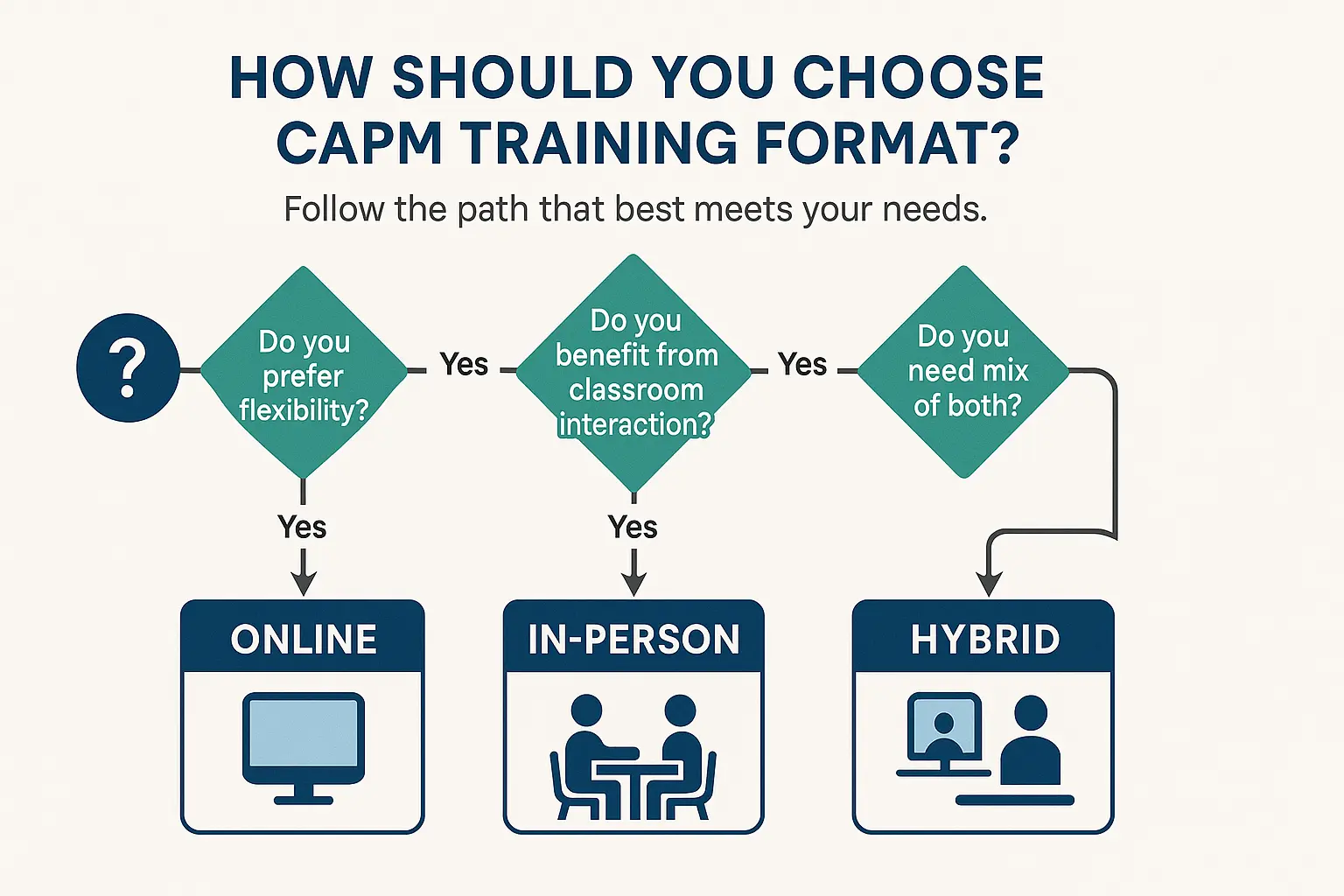
How to Choose the Right CAPM Course for You
Preparing for the CAPM exam starts with choosing the right training program. A quality CAPM course equips you with the essential knowledge, tools, and confidence to succeed on exam day. Comprehensive study material is a key component of effective CAPM preparation. It covers the fundamentals of
The right course not only helps you pass the exam but also builds a strong foundation for your future in
What to Look for in a CAPM Training Program
When looking for a CAPM course, there are important things to check. Make sure the program covers all CAPM exam topics. It should also offer detailed study materials.
- Relevant and updated course content
- Experienced instructors
- Flexible training options (online, in-person, or hybrid)
- Practice exams and quizzes
Online vs In-Person vs Hybrid: Pros and Cons
The format of your training is also important. Each option has its own benefits and drawbacks.
| Training Format | Pros | Cons |
|---|---|---|
| Online Training | Flexibility, self-paced learning | Limited interaction, technical issues |
| In-Person Training | Direct interaction, hands-on experience | Location constraints, fixed schedule |
| Hybrid Training | Combines flexibility with direct interaction | May require more planning and coordination |
Making the Most of Your CAPM Course
To get the most out of your CAPM course, be active. Dive into the course materials, join discussions, and take practice exams. Studying with a team can boost your understanding, as team members can share insights, clarify concepts, and support each other’s exam preparation. This helps you check your understanding.
By picking the right CAPM course and staying committed, you’ll feel ready for the exam.
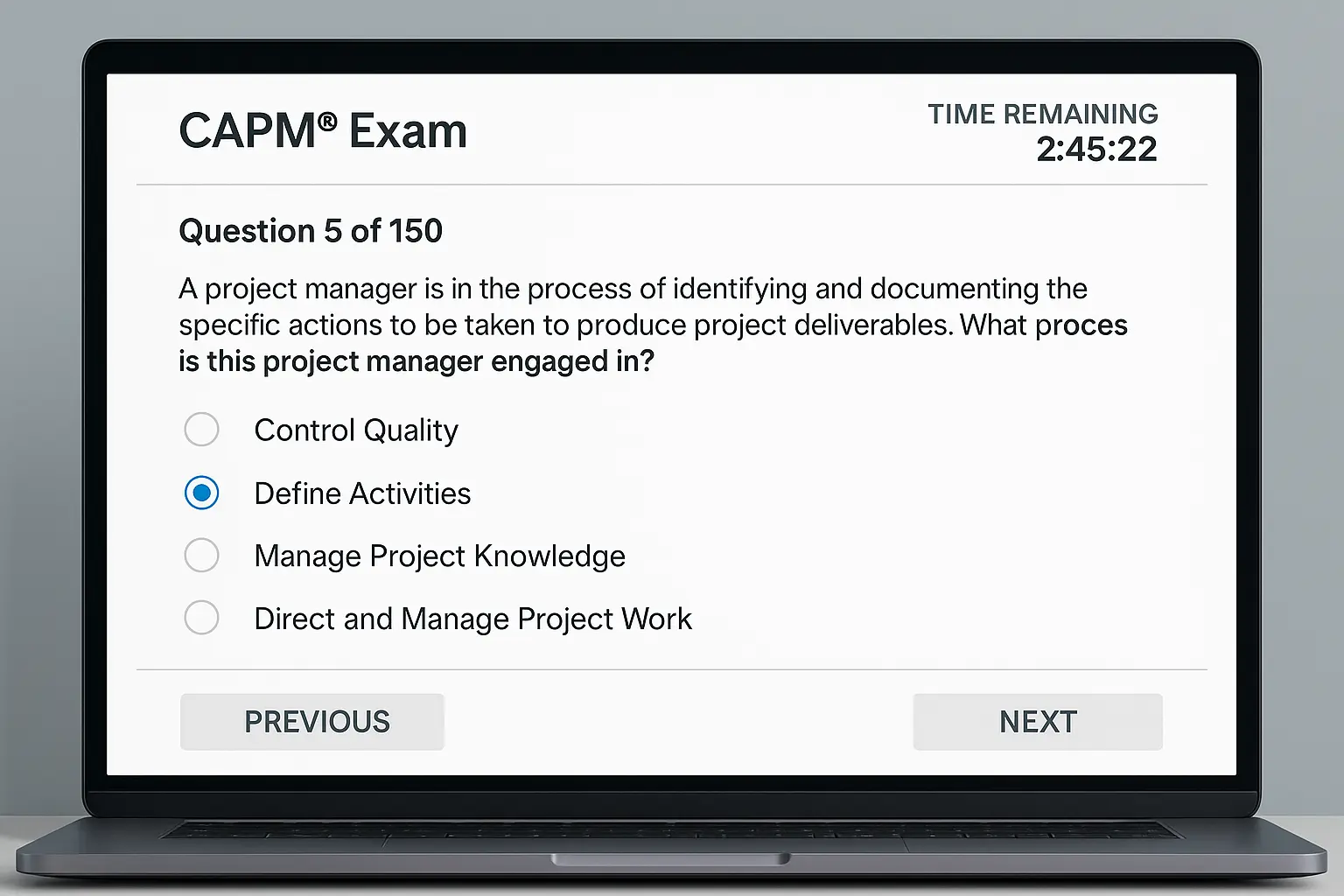
Everything You Need to Know About the CAPM Exam
Preparing for your CAPM certification? Understanding the exam format is essential. The Certified Associate in
It follows the PMI framework and aligns with the PMBOK® Guide. The exam consists of 150 multiple-choice questions, which you must complete within three hours. Questions cover areas like project integration, scope, time, cost, quality, and risk management.
Knowing what to expect can boost your confidence and help you focus your study efforts. A clear understanding of the format sets the stage for exam success. Be sure to consider the costs associated with registering for the CAPM certification exam, including exam fees and any additional expenses for study materials or training.
CAPM Exam Structure and Key Details
The CAPM exam has 150 multiple-choice questions. You have three hours to finish it. It checks your grasp of the
| Exam Details | Description |
|---|---|
| Number of Questions | 150 |
| Exam Duration | 3 hours |
| Question Type | Multiple Choice |
CAPM Exam Topics and Knowledge Areas
The CAPM exam covers many
- Project Integration Management
- Project Scope Management
- Project Schedule Management
- Project Cost Management
- Project Quality Management
- Project Resource Management
- Project Communications Management
- Project Risk Management
- Project Procurement Management
Knowing these areas well is key to doing well on the exam.
Study Tips to Pass the CAPM Exam on Your First Try
Want to pass the CAPM exam the first time? Here are some tips:
- Make a study plan and stick to it.
- Use a mix of study materials, like textbooks, online courses, and practice exams.
- Focus on understanding concepts, not just memorizing them.
- Practice with sample questions to get used to the exam format.
- Join a study group or online community for motivation.
By following these tips and staying committed, you can pass the CAPM exam on your first try.
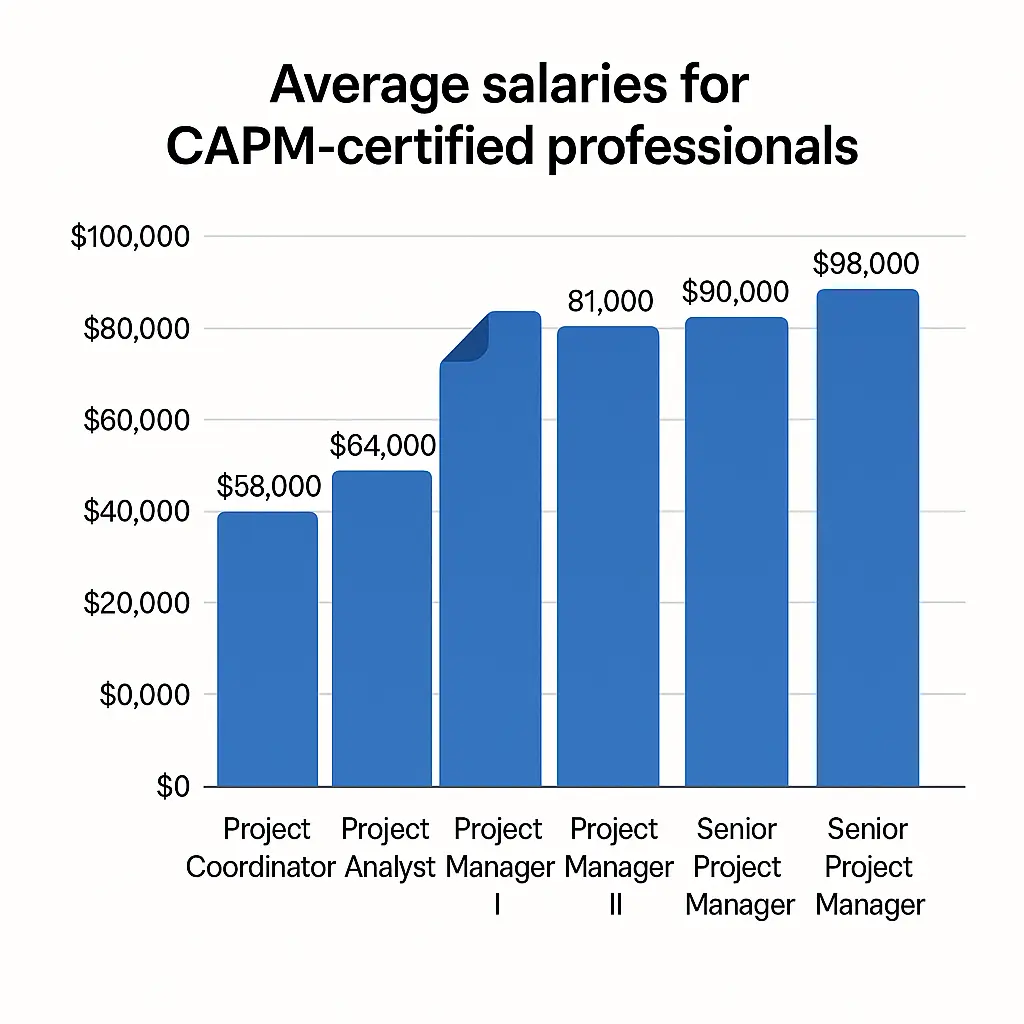
CAPM Certification Salary and Career Opportunities
The Certified Associate in
By earning your CAPM, you signal to employers that you are committed, knowledgeable, and ready to take on project-related responsibilities. This can give you a competitive edge in the job market, especially for entry-level roles or positions that require foundational project management skills. The CAPM certification can qualify you for roles such as associate project manager, which is a key entry-level position for those beginning their
Whether you’re a student, recent graduate, or professional transitioning into the field, the CAPM can boost your credibility and open new opportunities. There is a growing demand for
Additionally, the CAPM certification helps you develop expertise that is valued by organizations across various industries, supporting long-term careers in
Entry-Level Jobs You Can Get With CAPM
With CAPM certification, you can land various entry-level
- Project Coordinator
- Junior Project Manager
- Project Assistant
- Project Management Associate
- Project Scheduler
These jobs are found in many industries like construction, IT, finance, and healthcare. This offers many opportunities for CAPM holders.
What Is the Average CAPM Certification Salary?
Payscale reports that a Certified Associate in Project Management earns an average of $74,000 in the US as of October 2024. Salaries differ based on location, industry, experience, and employer.
| Job Title | Average Salary (US) |
|---|---|
| Project Coordinator | $62,000 |
| Junior Project Manager | $70,000 |
| Project Assistant | $58,000 |
Advancing Your Career After CAPM
CAPM certification is a good start, but many aim for PMP or agile/Scrum certifications next. More education and experience can boost your career in
By using your CAPM certification, gaining experience, and furthering your education, you can reach senior roles. This can also increase your salary and career opportunities.
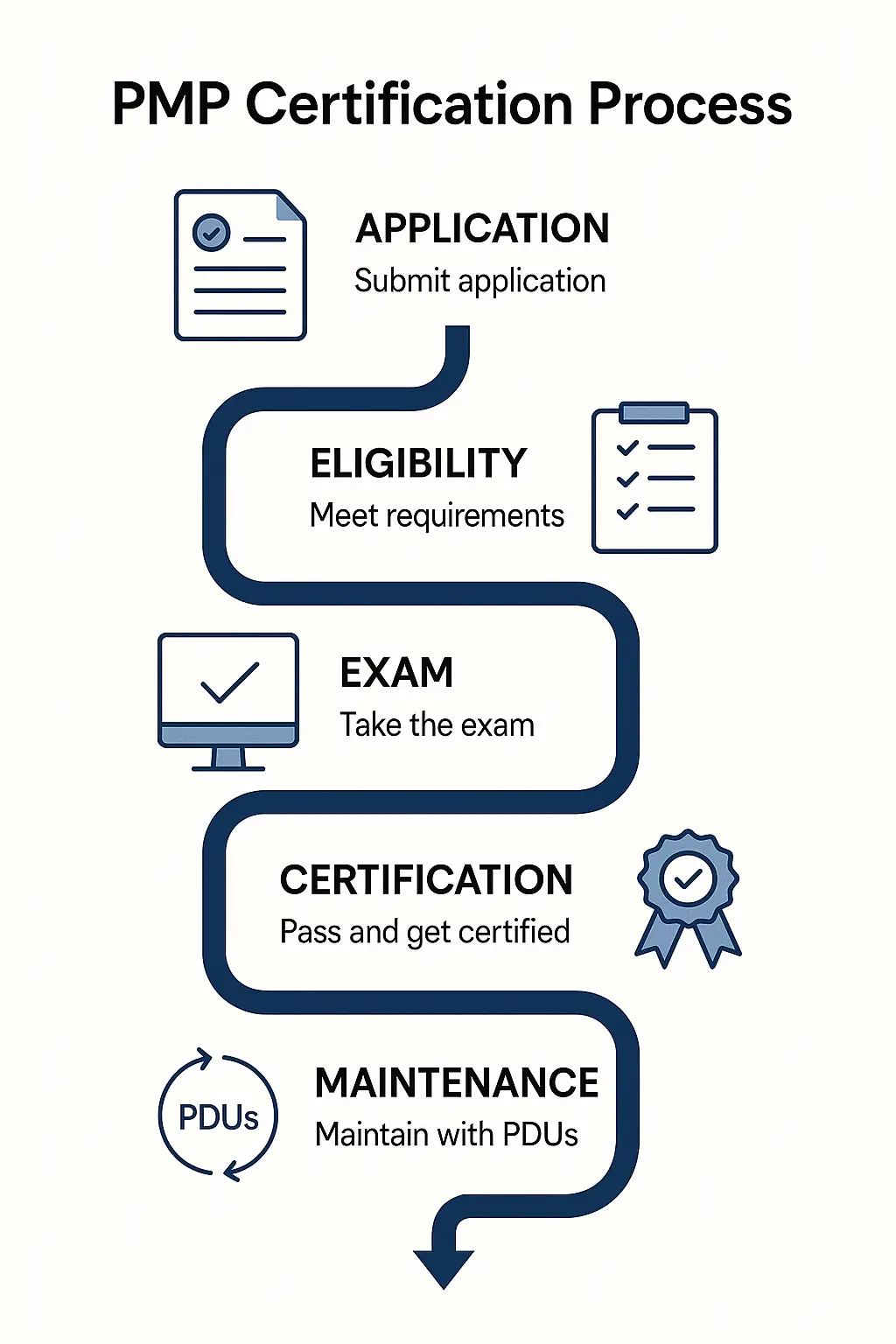
How to Get and Maintain Your CAPM Certification?
To earn your CAPM certification, you’ll need to follow a few essential steps: apply through the PMI website, register by providing your education and training details, and schedule your exam once approved.
The application ensures you meet the eligibility criteria, including a secondary degree and 23 hours of
Once accepted, you’ll receive instructions to pay the exam fee and select a test date. Understanding this process helps you stay organized, avoid delays, and move forward with confidence in your certification journey. CAPM-certified professionals serve as valuable team members in project environments, contributing their knowledge and skills to support project success.
How to Apply, Register, and Schedule Your CAPM Exam
First, you must apply and register for the exam. You need to meet the
After meeting these requirements, create a PMI account, fill out the application, and pay the exam fee. The CAPM certification cost changes based on whether you’re a PMI member or not. PMI members pay a lower exam fee, while non-members pay a higher fee for the same certification. Once you apply, you’ll get an email to schedule your exam within a certain time.
- Create a PMI account and fill out the CAPM application form.
- Pay the exam fee, which is lower for PMI members.
- Receive your exam authorization email.
- Schedule your exam through the PMI website or by calling the Prometric testing centers.
What Happens After You Pass the Exam
Passing the CAPM exam gets you a five-year certification. You’ll need to earn Professional Development Units (PDUs) to keep it.
After passing, PMI will send you a certification packet. This includes your certificate and a wallet card. You can then use the CAPM credential to boost your resume and career in
How to Maintain Your CAPM with PDUs
To keep your CAPM certification, you must earn 15 PDUs in five years. You can get PDUs from courses, webinars, workshops, or
| PDU Category | Description | Example Activities |
|---|---|---|
| Education | Earning PDUs through educational activities | Attending |
| Professional Engagement | Earning PDUs through professional activities | Participating in |
| Self-Directed Learning | Earning PDUs through self-directed activities | Reading |
It’s important to track and report your PDUs on the PMI website to keep your certification. The CAPM renewal process requires submitting your PDU records and paying a renewal fee. You must fulfill all renewal requirements to maintain your certification status.
By following these steps and staying committed to your professional growth, you can keep your CAPM certification. This will help you advance in your

Wrapping Up: Take the First Step Toward Your Project Management Career
Getting your CAPM certification is a big step in your
With CAPM certification, you boost your knowledge and open up new career paths. It’s great whether you’re new to the field or moving into
Now you know what CAPM certification is all about. It’s time to start. Look at the eligibility and how to apply. Pick a CAPM course that works for you, and start your path to becoming a certified project manager.
Getting your CAPM certification is a smart choice for your
References
Indeed Career Guide. (n.d.). CAPM certification jobs: What you need to know. Indeed Career Guide. https://www.indeed.com/career-advice/finding-a-job/capm-certif
Fisher, J. (2024). CAPM certification salary: What you need to know. Forbes Advisor. https://www.forbes.com/advisor/education/certifications/capm-certification-salary/
Project Management Institute. (n.d.). Certified Associate in
Project Management Institute. (n.d.). PMP® vs CAPM®: Which certification is right for you? https://www.pmi.org/blog/pmp-vs-capm
